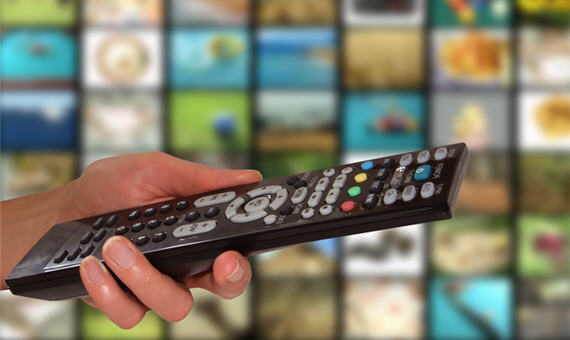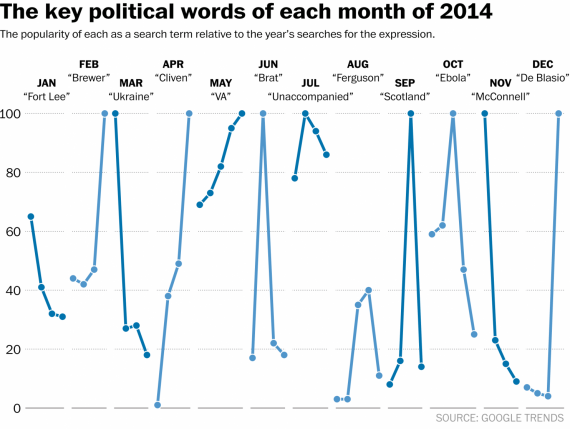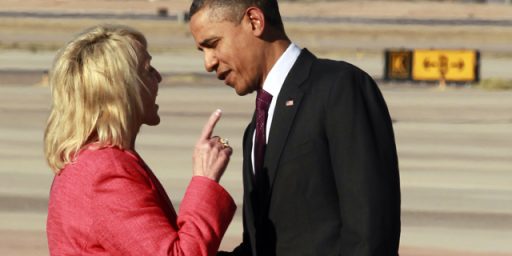2014’s Fickle News Cycle
The news cycle in 2014 seemed to be dominated by a series of real and phony "crises" that grabbed our attention for short periods of time.
Using the Google’s Trends Tool, The Washington Post’s Philip Bump came up with this chart showing the most-searched words and phrases during each month of the past year related to political or news events, and what it tells us about how fickle the 2014 news cycle was:
Most of these are, of course, self-explanatory, but I’ll admit that I had to read further to remember what some of the news events that prompted these searches might have been. “Fort Lee,” for example, refers to Fort Lee, New Jersey, which was the focus of the lane closures on the George Washington Bridge that became known as “Bridgegate.” February’s “Brewer” search refers to Arizona Governor Jan Brewer and the controversy during the second month of the year over a bill that would have given businesses more ability to discriminate against same-sex couples based on supposed religious beliefs, an issue which we apparently didn’t even touch on here at OTB and a bill which Brewer ultimately vetoed.“Cliven” refers to Cliven Bundy and the standoff at his ranch in Nevada due to his defiance of several Federal Court Orders, which became something of a cause celebre on the far-right, and so forth. Perhaps most interesting about the chart is the fact that the disappearance of Malaysian Airlines Flight 370 in March didn’t make the top of the list for any month.
The biggest thing about this chart, though, is that it tends to show just how fickle and fast changing the news cycle was over the past year. To some degree, given how eventful the year actually was — with major stories ranging from Ukraine, to the Veterans Administration scandal, to the rise of ISIS in Iraq and Syria, Ebola, the protests in Ferguson and elsewhere over the Michael Brown shooting and, later in the year, the decision of the Grand Jury there and another in New York City to decline to indict police officers under circumstances that many found suspicious and the protests those decisions led to, and of course the midterm elections — this isn’t entirely surprising. Arguably, 2014 has been a far more crisis-filled year, both in terms of actual crises and those created by media sensationalism, At the same time, though, it’s interesting to see this measure of what the public is seeking information on over such as relatively short period of time and the extent to which it shows that our “news and information” attention span is really quite short-lived these days. With a new Congress coming into office next week, and the 2016 Presidential campaign likely to gear up early in the year, though, we’re likely t see the headlines jump all over the place this coming year as well. And then, of course, there are always the unexpected events that come to dominate the news cycle for short periods of time. That seems to be the nature of the medium these days, so we can probably expect more of the same there.








I think every year seems like this in immediate retrospect, with news stories coming and going quickly. With a little more perspective, though, and a yearlong review, you’d see the 2014 elections and the police – minority tensions as the top stories of the year, and each of them captured two month on this graph.
Interestingly, despite the stereotype, Americans are interested in other countries.
“Ebola” was huge.
The GOP could not find blame in the stock market, the economy is in recovery, ACA is looking to be a continued success (even recalcitrant red states are getting on board), deficit is down, hiring is up.
So, a Fox News crisis was created, that disappeared right after the midterm elections.
http://www.foxnews.com/health/2014/09/04/grim-ebola-prediction-outbreak-is-unstoppable-for-now-doc-says/
Nice.
Great little propaganda machine there.
To me, the “Ebola Crisis” was probably the worst of the year – if only because of the potential seriousness of the Ebola outbreak in West Africa.
There was no perspective whatsoever. More time was spent on domestic political coverage of the “Ebola Crisis” in America, than on real informative discussions of the public health infrastructure that would have to deal with any cases of Ebola here in America. Republicans predictably and disgracefully spent a few weeks accusing the president of exacerbating the “crisis” and putting millions of Americans at risk by his actions (or in this case, alleged inactions.)
The press covered the political game and paid less attention to the facts of the “Ebola Crisis,” preferring the “Republicans say the nation is at risk because of our president” story to the actual facts of the story, which was that the CDC and important regional medical facilities knew what they were doing, and finally, more people died at the hands of OJ Simpson than of Ebola.
LOOK!! SHINY OBJECT!!
I blame what passes as the media in this country. We have become a national tabloids with few investigative reporters and little use for the facts.
It’s not like anybody had to search the internet for information about that event. CNN had nonstop breathless coverage for 7 straight weeks.
If you want news – actual news – on TV or radio, your best bets are state-sponsored rather than for-profit media: BBC, Aljazeera, NPR.
Profit-driven media almost inevitably become a race to the bottom: Fox, CNN, and MSNBC. The exceptions are legacy newspapers like the NYT, and they may well succumb in time.
A big cause of the disagreements between people here in the comment threads is the information gap between the Lowest Common Denominator (Fox News) and the legacy and elite media (NYT, BBC.) The LCD gets the media equivalent of McDonalds: cheap and unhealthy.
@michael reynolds:
I think part of the difference is the amount of commentary – things may have changed, but I recall Voice of America and the BBC being pretty dry. Folks apparently like hearing Sean Hannity or Piers Morgan ranting about things . . . I’ll admit that I spent most of my time at FP reading the columnists like Drezner or Walt rather than the headlines.
Having said that, while I agree that NYT/WSJ are ok for general use (and certainly better than the big three), I’d say that more specialized sources are the best bet for any kind of depth or analysis: Politico, Foreign Policy, National Interest, CNAS, etc. To be fair, those also have their drawbacks – Politico borders on a DC gossip rag sometimes, and others (National Interest comes to mind) are usually pushing a particular angle, but I think it’s useful to have some of that as long you get it from a couple of angles and don’t swallow any of it whole.
@CET:
Look how active your news consumption is. Most news comes to most people in a much more passive way. They’ll have CNN on as background noise, and focus only when they hear something interesting to them. You (and I) go in search of information, most people are fed a news diet high in sugar – they’re fed that for which they’ve already developed a taste. News consumed in that fashion, news provided with the profit-driven intention of avoiding anything that will turn a viewer off, ceases to be news at all. It becomes a reinforcement mechanism, feeding you bullsjit because you’ve evidenced a taste for bullsjit.
It’s why there’s such a disconnect here between people whose notion of ‘news’ is not news at all and people – intellectuals with time on their hands – who have at least some interest in understanding world events. It’s a class thing, an IQ thing, a philosophical thing, that divides us. Outfits like BBC, freed from the profit imperative, still make an effort to report news, outfits like Fox are just feeding sugar to addicts for profit.
What would qualify as “non fickle” news in your mind? Has there ever been a time where the top “search term” was (or would have been) the same from one month to the next?
The kerfuffle over the movie “The Interview” may be the best thing that happened to Cheney…just before that the NYT…who for years refused to use the word torture…was calling for his prosecution…but it got no traction once Sony took the movie out of the theaters and distracted everyone. Oooh…bright shiny object.
@CET: “Folks apparently like hearing Sean Hannity or Piers Morgan ranting about things . . ”
Sadly, several million people do seem to like hearing Sean Hannity ranting. But in a rare bright spot for the American public, it turned out that no one wanted to hear Piers Morgan.
I remember Cliven…the guy that owes the US taxpayers more than a million and is a right wing hero.
I also remember the guy in NY selling single cigarettes who the right wing thinks was a criminal thug that deserved to die.
@Ron Beasley: That’s mainly because the news organizations don’t want to pay actual reporters any more. It’s much easier to get three pundits in a room, send out some goof with a cam on his shoulder “how did you feel, Mrs. Benson, when you saw your only child tragically crushed under a steamroller?”, and ignore actual reporting entirely.
Watergate would never have been uncovered today because it would have taken too long for the present hummingbird brains of the so-called media.
Shiny, indeed.
@Tony W: Yes, and their two commentators were stuck in that phony flight simulator for days on end.
I am unhooking the satellite and hooking up an antenna that shows stations crystal clear. I am going to get an amateur radio and see what I can find. I have a nice cb but no one uses those anymore.
Enough of the “breaking news” junk: it usually isn’t breaking or news. So long, Wolf.
Reynolds figures out that most cable shows are opinion shows, not news shows, including the one with the host he obsesses over. Preens around lecturing about IQ.
Others laugh while thinking “figure that out all by yourself did ya?”
@Guarneri:
Actually, CNN is not mostly opinion, it’s mostly rather dull reporting. Not sure who you think I “obsess” over, unless it’s my long-running vendetta against Wolf Blitzer as the most aggressively boring man on TV.
and almost on cue- another jet lost in asia, cnn laughs last.
@michael reynolds: Wolf Blitzer – boring: I’ll drink to that.
@Tyrell:
He makes me crazy. I can’t stand his voice. I can’t stand his blank stare. I can’t stand the fact that he never, ever asks the right questions. He is the dullest man in television.
@C. Clavin: Please point us to the right wing pundit who said that Eric Garner deserved to die. What I’ve noticed, from left to right, is a sense and statements that justice was not served and that the grand jury should have handed down an indictment for something.
@michael reynolds:
Your post pretty much says it all. I’ve never really thought of it that way for the “LCD” group, but you are quite right. I have…*checks* 22 news sources bookmarked on my browser. Some I only visit occasionally (like Sydney Morning Herald after the recent incident there) but the top 10, including BBC, CNN, Al Jazeera English, this blog, Politico, Huffpost & The Blaze (to get a taste of partisan thinking) Christian Science Monitor, Spiegel – I visit these between daily and weekly. I also visit numerous locals television news and regional papers (and the NYT) to keep track of my hometown, my college town, my current city, etc.
Like you say, that is not a typical American consumer’s news profile, even those who take “an interest” in events are liable to maybe read USA Today on their phones (I do that each morning myself to wake up in bed), have CNN on in the background, and maybe, MAYBE read their local paper.
Doing that gives you a vague idea of what’s going on (“oh yeah, I heard something about that”) and makes you an easy mark for the infotainment people.
It is kind of sad that state-sponsored media is the best, because that too has limitations. I don’t worry too much about NPR (obviously liberal journalists but pretty fair journalism) or BBC (probably my all-time favorite) but, as good as Al Jazeera can be, the fact that they ultimately answer to the al-Thani royal family tells me that their Middle East coverage in particular can only be trusted insofar as you remember it carries with it a Sunni/Gulf Arab agenda. Also, I trust their coverage of Israeli-Palestine issues to be even-handed about as much as I do the Jerusalem Post’s to be so.
Al-Jazeera also gets a kick out of picking the wounds of American racial injustices and other First World inequities (which often leads to some great journalism) which kind of pisses me off when I remember Qatar isn’t exactly a humanist paradise. I still find the “alternative” viewpoint they focus on invaluable, however.
this was a similar analysis . What we talked about as viewed through 184.5 Million Twitter Mentions. The flight does show up on this one.